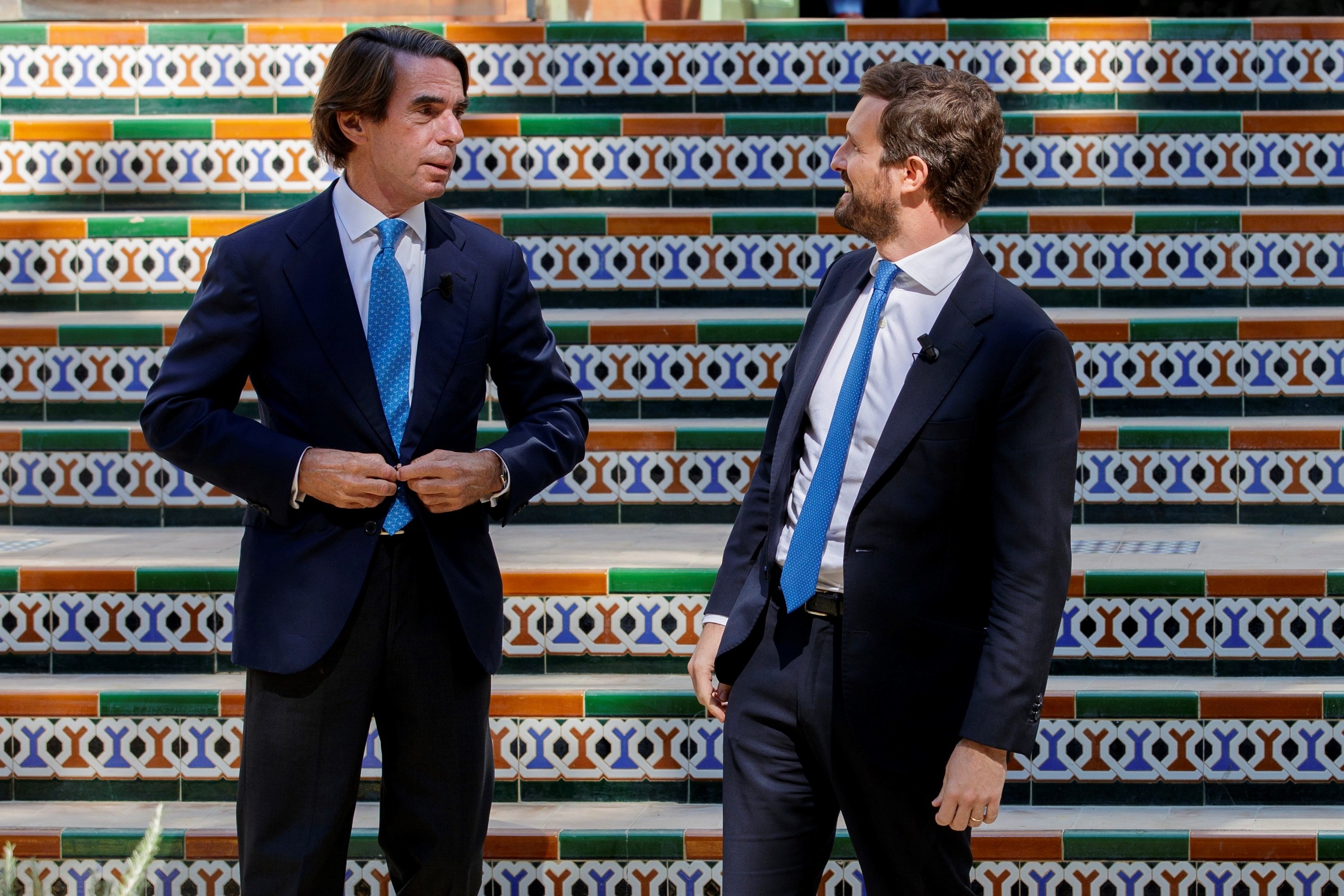The annual convention of Spain's conservative Popular Party had already abandoned moderation in its first session - with addresses from Mariano Rajoy and Alberto Núñez Feijóo. Today, the stage moved to Seville and the special guest was José María Aznar. The former Spanish prime minister seldom fails to raise the temperature, and today he was especially triggered when his favourite subject came up: Catalonia. The former PP leader lashed out forcefully against the independence movement and against the Spanish coalition government: "Spain is one nation, not seven, not four, not twenty-one. It is not a pluri-national state, nor a multi-level state, nor anything else of the sort". Party leader Pablo Casado was completely eclipsed.
Aznar, who has given strong support to Pablo Casado's PP in its relaunch, expanded on the territorial question, which he considers to be the most serious issue that Spain faces today. And he pointed his arms against the Spanish government. First, for their parliamentary alliances: "A terrorist organization like [Basque pro-independence party] Bildu is a partner to the government. Those [Catalan parties] who have staged a coup... are partners to the government." Also against the role of the state solicitors' office in the Puigdemont case: "That the office should be used to prevent a fugitive from being extradited to Spanish justice is totally scandalous and shameful." And he came out in defence of monolingualism in state institutions: "Spanish is spoken in the institutions of Madrid, which is the language that everyone understands."
Aznar was not short of ammunition, not even against the Catholic Church. He took aim at the church over Pope Francis's apology for the conquest of Mexico. He did not quote it directly, but it was understood perfectly: "In these times when people are asking forgiveness for everything, I won't do it, no matter who says." He came out in defence of the history of Spain: "With its successes and failures, I am proud of it and I do not apologize."
After a few years in which José María Aznar had moved away from the conservative party, today he wanted to close ranks with the current Popular Party leader, to whom he said: "You will be prime minister of Spain." And he went on, "And also, you'll do it well."
Casado and the Pope
In this hyperventilated context, Pablo Casado did not hold back either. He also lashed out verbally against Pope Francis and his "historical revisionism", which he has classed as "stupidity". He came out in defence of the Spanish nation, "after Greece and Rome the most important in the history of mankind in terms of its contribution to other countries." And he said: "The phenomenon of Hispanidad should make us proud despite the black legend, the cancel culture and this stupidity of historical revisionism sponsored by the parties that occupy the Spanish government."
This Thursday’s event was part of the fourth day of the PP’s Spanish convention, which this year involves 25 panel discussions in six Spanish cities, culminating this weekend in Valencia. Sources in the PP leadership explain that with this event Pablo Casado seeks to relaunch the Popular Party brand, position it as an alternative to the current Spanish government and "expand the PP to the right and left." All this, while Casado is pressured on one side by Madrid Community president Isabel Díaz Ayuso and, on the other, receives warnings from the more moderate wing of the party.
Rajoy and González, in parallel
In parallel to Aznar, two other former Spanish PMs, Mariano Rajoy and Felipe González, held a dialogue. But in a very different tone. In fact, both agreed to defend the state's dialogue with the Catalan government. Former PP leader Rajoy responded in his own inimitable style: "To me it seems okay to talk. I have spoken”. However, he also noted that he "doesn't like" the impression that the two governments "are on the same level". First of all, because "it's not the same level." Secondly, because he believes that "in any kind of conversation it is advisable to take care of everyone else, because here everyone has their problems and their stories." And he made it clear the limits, which are no different to those of the Pedro Sánchez government: “There is a limit here, which is the Constitution. The Constitution and the principle of national sovereignty are not subjects that any of those sitting down to talk have the competence to discuss."
Felipe González was also asked about the dialogue table between the Spanish state and the Catalan Generalitat, and he also endorsed its existence, with his own boundaries and red lines: “Would I be against a dialogue with the Generalitat? No. And against the other half of Catalonia that the Generalitat does not represent? Neither. ” In this sense, the former socialist president has said that he "does not demonize" and that he sees dialogue as a good thing "if it is done with respect for the Constitution".

